|
|
|
Sort Order |
|
|
|
Items / Page
|
|
|
|
|
|
|
| Srl | Item |
| 1 |
ID:
173284
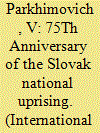

|
|
|
|
|
| Summary/Abstract |
ON AUGUST 29, 2019, Slovakia celebrated the 75th anniversary of the start of one of the most powerful European anti-Nazi insurrections of World War II, the Slovak National Uprising (Slovenské narodné povstanie), which lasted from August 29 to October 28, 1944. August 29, Slovak National Uprising Anniversary, is one of the country's main national holidays. It is marked with events and ceremonies such as commemorative rallies and the laying of flowers at memorials in Bratislava, Banska Bystrica, and other parts of Slovakia.
|
|
|
|
|
|
|
|
|
|
|
|
|
|
|
|
| 2 |
ID:
127117


|
|
|
|
|
| Publication |
2013.
|
| Summary/Abstract |
Since the end of the Cold War, political scientists have radically reexamined the role that elections play in authoritarian contexts. Some argue elections are congruent with authoritarianism and actually help to stabilize non-democratic forms of rule. Others challenge this claim by arguing that elections can function as a mechanism for democratization. We test whether elections have functioned as a mechanism of change or of neo-authoritarian stability in the postcommunist world. We generally find that elections neither promote democracy nor strengthen authoritarianism. However, we do find that in energy-rich states elections promote authoritarianism, though of a somewhat more benign sort. We also find that the mechanisms of electoral participation and competitiveness thought to promote democracy function differently in the postcommunist context and explore this in greater detail through a paired case study of electoral mobilization in Slovakia and Belarus.
|
|
|
|
|
|
|
|
|
|
|
|
|
|
|
|
| 3 |
ID:
128987
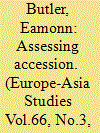

|
|
|
|
|
| Publication |
2014.
|
| Summary/Abstract |
On 1 May 2014, the European Union (EU) celebrated the tenth anniversary of the accession of ten member states-Cyprus, Czech Republic, Estonia, Hungary, Latvia, Lithuania, Malta, Poland, Slovakia and Slovenia. Of these ten new members, eight were Central and East European (CEE) countries that had, for most of the twentieth century, been governed by communist regimes either as republics of the Soviet Union (Latvia, Lithuania and Estonia), satellite states of the Soviet Union (Poland, Hungary, Czech Republic, Slovakia) or as a constituent republic of Yugoslavia (Slovenia). In the subsequent ten years three additional post-communist countries have acceded to the EU (Romania and Bulgaria in 2007 and Croatia in 2013). Commenting on the 2004 EU accession of the first eight former communist countries, the then Irish Prime Minister and President of the European Council, Bertie Ahern, wrote that there was
a particular historical resonance as eight of the former communist countries in the east have emerged from the shadows of the Iron Curtain to join us in working for common goals and for mutual benefit. The artificial divisions, which have blighted our continent's history for so long, are finally being laid to rest.1
|
|
|
|
|
|
|
|
|
|
|
|
|
|
|
|
| 4 |
ID:
169864
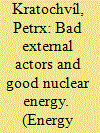

|
|
|
|
|
| Summary/Abstract |
For Central and Eastern European countries, energy security has been one of the top political topics ever since the 2009 gas crisis. Although these countries have a shared interest in this issue, their preferences – especially those regarding the role of Russia as their main energy supplier – are not identical. This paper examines and juxtaposes the discourses on natural gas supply in the Czech Republic and Slovakia. Utilizing a broadly constructivist perspective, the article explores the media discourses connected to energy supplies in these countries. Methodologically, the paper employs critical discourse analysis to examine this discourse. The paper argues that the media discourses in both countries underline the overall unreliability of the external environment and stress the necessity to rely on domestic energy sources. In the Czech case, such an environment also includes the EU, which translates into a critical stance towards renewable energy, viewed as being forced on country by the EU. In contrast, the Slovak discourse presents the EU as a suitable arena for energy cooperation. Both countries agree on the support for nuclear energy, which is considered to be a domestic – and therefore most reliable – energy source.
|
|
|
|
|
|
|
|
|
|
|
|
|
|
|
|
| 5 |
ID:
131149
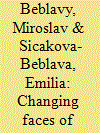

|
|
|
|
|
| Publication |
2014.
|
| Summary/Abstract |
The paper looks at the European Union's impact on corruption in Slovakia, both before and after the country's accession to the European Union. It shows that even though pre-accession channels of influence diminish or disappear, membership brings new means of influence. Our methodology looks beyond institutional changes and explicit anti-corruption mechanisms. Before 1999, the European Union's influence on corruption was close to zero, and between 1999 and 2004, its influence was strong and positive. Post-accession developments are more ambiguous, but despite an apparent worsening of corruption after 2004, we observe a transformation rather than a loss of European Union influence.
|
|
|
|
|
|
|
|
|
|
|
|
|
|
|
|
| 6 |
ID:
087696
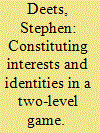

|
|
|
|
|
| Publication |
2009.
|
| Summary/Abstract |
This paper uses the conflict between Hungary and Slovakia over the Gabcikovo-Nagymaros Dam to examine two foreign policy issues. The first is how states determine their interests and how perception of gains and losses arise and change. The second is the reality that international norms are rarely clear and often conflict, making answering questions of whether states have "internalized" or are abiding by norms problematic. This case is a good vehicle for addressing these questions as the dam dispute began during the communist period and has continued through the political and economic transitions to European Union membership. It also was the focus of a groundbreaking International Court of Justice case on the application of ecological necessity to treaty obligations. Fleshing out the model of a two-level game with insights from other theoretical perspectives, this article argues the key to this stalemate is the interrelated process through which state identity and understandings of vital interests change, creating frames in each state around different international norms.
|
|
|
|
|
|
|
|
|
|
|
|
|
|
|
|
| 7 |
ID:
119615
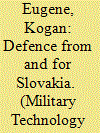

|
|
|
|
|
| Publication |
2012.
|
| Summary/Abstract |
Slovakia has a large defence industry but few aerospace firms. The Slovak defence industry focuses on the design, development and manufacture of ammunition and artillery systems, armoured combat and transport vehicles, short- and long-range radar and navigation systems, and mine-clearing equipment. Although some Slovak defence companies have successfully exported their defence produts to Western Europe and North America, domestic and regional customers continue to be the primary clients for the Slovak defence industry.
|
|
|
|
|
|
|
|
|
|
|
|
|
|
|
|
| 8 |
ID:
132847
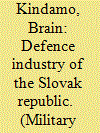

|
|
|
|
|
| Publication |
2014.
|
| Summary/Abstract |
The security and defence industy association of the Slovak republic is a national independent and non-profit association representing the interest of Slovakia's security and defence industry
|
|
|
|
|
|
|
|
|
|
|
|
|
|
|
|
| 9 |
ID:
091596
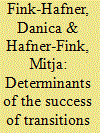

|
|
|
|
|
| Publication |
2009.
|
| Summary/Abstract |
The article provides an analysis of the determinants of the success of transitions to democracy based on a combination of qualitative comparative analysis of Poland, the Czech Republic, Slovakia, Hungary, Slovenia, Croatia, Bosnia & Herzegovina, Serbia, Montenegro and Macedonia; and hierarchical clustering. The key finding is that one can reveal configurations of several factors which jointly determine either continuous or disrupted transitions to democracy.
|
|
|
|
|
|
|
|
|
|
|
|
|
|
|
|
| 10 |
ID:
121011
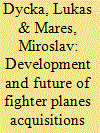

|
|
|
|
|
| Publication |
2012.
|
| Summary/Abstract |
In times of raging economic crisis, the Czech Republic, Slovakia, Hungary, and Poland-or the so-called Visegrad countries (V4)-are reevaluating their defense procurements programs. The most visible of them are traditionally acquisitions of fighter planes. However, not only the recent lack of funds but also geopolitical orientation, military ambitions, and corruption must be taken into account when assessing the origin of the planes in the air forces of the V4 countries. Despite the similar time period in which the first round of fighter procurements took place (2002-2005) this article shows that very different approaches and factors influenced the selection process. This resulted in different outcomes both in types of planes and forms of acquisition. The future equipment of fighter fleets also hangs in the balance and is currently a source of considerable debate, which is assessed and summarized in the final chapter of the article.
|
|
|
|
|
|
|
|
|
|
|
|
|
|
|
|
| 11 |
ID:
171372


|
|
|
|
|
| Summary/Abstract |
The European Union has recently decided to stop the policy of biannual clock changes in 2021. One reason is that the original rationale for the policy, energy savings, is not supported by a large portion of recent empirical studies. Whether the new permanent time will be standard time or the former daylight saving time has not been decided. Evidence on energy savings from daylight saving time is country-specific, and each country may choose its own time. We examine the effects of the policy in a country for which no studies on daylight saving exist, Slovakia. Using hourly data from the 2010–2017 period, we apply a difference-in-differences approach and estimate energy savings to equal 1% of annual electricity consumption. Alternatively, extrapolating the effect from the results of a previous meta-analysis on different countries, for Slovakia we obtain a smaller estimate, unlikely to exceed 0.5%. Moreover, our findings suggest that daylight saving time smooths the electricity demand curve.
|
|
|
|
|
|
|
|
|
|
|
|
|
|
|
|
| 12 |
ID:
163780
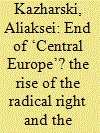

|
|
|
|
|
| Summary/Abstract |
The article analyses the effects of the migration crisis and the parallel rise of right wing parties on national and regional identities in Slovakia and the broader subregion of the Visegrad Four. It argues that the recent right wing political discourse around migration has been reshaping the meaning of ‘Central Europe’ as a normative project and an identity shared by the V4 countries. The post-Cold War narrative of Central Europe was a story of ‘returning to the West’, which in practice meant that normative conformity with the West was a precondition of membership in key Western institution. The situation has changed visibly after the migrant crisis, as the V4 political elites have now been constructing new identities, in partial juxtaposition with Western European liberalism. These new identities favour a culturalist, conservative interpretation of the nation and reject humanitarian universalism, epitomized by the European Union’s decision to welcome the refugees. This arguably devaluates the previous notion of ‘Central Europe’ as a region that seeks to identify itself firmly with the West. Slovakia is chosen as a case study because of the recent success of the radical right in the 2016 parliamentary elections. The article concludes that although the situation of being structurally locked into the EU does not allow the V4 countries to openly challenge its main principles, the V4 political elites pursue a counter-hegemonic strategy, subverting and resignifying some of its key political notions. One should, therefore, speak not of an end of ‘Central Europe’ but rather of its evolution into a new, hybrid stage, where normative conformity and identification with the West will only be partial. The article makes use of Laclau and Mouffe’s theory of discourse and related concepts as well as insights from constructivist geopolitics literature to track articulatory practices of the regional establishments. The study relies on evidence from recent political campaigning in Slovakia as well as official Visegrad Group documents from 2015 to 2016.
|
|
|
|
|
|
|
|
|
|
|
|
|
|
|
|
| 13 |
ID:
186458


|
|
|
|
|
| Summary/Abstract |
Slovakia is one of the few countries with an official energy poverty definition. Nevertheless, it is listed among the ten most lagging EU Member States in terms of progress in alleviating energy poverty. There are also concerns about the fairness of measures to combat it. This paper builds on the energy justice perspective and a spatially-sensitive evaluation to critically analyse Slovak policies directly and indirectly tackling the issue. Do they reflect the three fundamental pillars of energy justice? And, given the issue's uneven socio-spatial occurrence in the country, are these policies designed and implemented to reduce pre-existing inequalities? We reveal that the multidimensional nature and specificities of energy poverty in Slovakia remain misrecognized in major policies. Moreover, there are shortcomings in the policies' distributional and participatory aspects. Most importantly, social welfare benefits are hard to access for energy-poor households, as are energy efficiency support schemes. Though some policies address dimensions linked to the issue, energy poverty's uneven incidence is not reflected. We conclude by pointing to the untapped potential of major policies in solving the problem.
|
|
|
|
|
|
|
|
|
|
|
|
|
|
|
|
| 14 |
ID:
099838
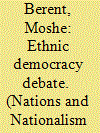

|
|
|
|
|
| Publication |
2010.
|
| Summary/Abstract |
Sammy Smooha's "ethnic democracy" model challenged the notion of the uniqueness of Israel by setting it as the archetype of a special type of democracy: "ethnic democracy". But contrary to what Smooha suggests, Israel's national identity is indeed unique. In each of Smooha's East European examples, besides the concept of a core ethnic nation, exists the notion of a civic territorial nation, which makes possible the integration or 'assimilation' into the dominant culture of those who are not members of the core ethnic nation. Yet, Israel's national identity does not recognise the existence of a civic territorial nation and makes no provisions for the integration or assimilation of non-Jews, especially Arabs, into the dominant Hebrew culture. Setting Israel as an archetype for his model prevents Smooha from exploring the possibility that, unlike Israel, East European "ethnic democracy" could be a transitional phase towards a liberal democracy.
|
|
|
|
|
|
|
|
|
|
|
|
|
|
|
|
| 15 |
ID:
079728
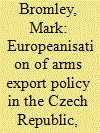

|
|
|
|
|
| Publication |
2007.
|
| Summary/Abstract |
This article examines changes in the level of transparency and the outcomes of arms export policies in the Czech Republic, Poland, and Slovakia since they joined the EU in May 2004, and determines the extent to which these changes are attributable to the 'Europeanisation' of this policy area. Following the approach of the existing literature, this article views the Europeanisation of EU arms export policy as the process by which certain key policy structures and decision-making processes become increasingly subject to systems of multi-level governance. The article finds that while Europeanisation has led to an increase in arms export policy transparency, its impact on arms export policy outcomes is harder to detect. At most, Europeanisation has been one of a range of factors driving change in this area
|
|
|
|
|
|
|
|
|
|
|
|
|
|
|
|
| 16 |
ID:
165648
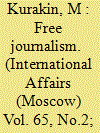

|
|
|
|
|
| Summary/Abstract |
IN DECEMBER 2018, an international forum, "Freedom of Journalism in the Context of Human Rights, New Technologies and International Information Security," took place in Pezinok, a suburb of Bratislava, the capital of Slovakia. It was attended by more than 70 experts and members of the media from 12 countries. The forum was organized by Moscow State University, the International Affairs journal, the Russian Union of Journalists, and several foreign media outlets. Russian Ambassador to Slovakia Alexey Fedotov said in his welcoming remarks that Bratislava is perhaps the best venue for such international conferences, considering the high level of mutual understanding that exists between Russia and Slovakia, as well as common Slavic historical traditions.
|
|
|
|
|
|
|
|
|
|
|
|
|
|
|
|
| 17 |
ID:
189201


|
|
|
|
|
| Summary/Abstract |
GERMANY'S interaction with the Visegrád Four [the Czech Republic, Hungary, Poland, and Slovakia], or the V4, is indicative of the continuity of Berlin's commitment to preserving the integrity of the European Union with its subregional integration formats. Accentuating commonalities and taking into account the differences between "old" and "new" Europe, the Germans act both as an intermediary in establishing compromises between the V4 and the EU and as an advocate of the interests of young EU member states, which are markets for German goods. The common denominator in Germany's and the V4's policies is sanctions against Moscow, although the approaches of the countries to the problem have their own nuances - for example, Berlin and Budapest differ in their approaches to energy security issues.
|
|
|
|
|
|
|
|
|
|
|
|
|
|
|
|
| 18 |
ID:
140572


|
|
|
|
|
| Summary/Abstract |
During that war, there existed the so-called Goebbels propaganda, which was named after one of the top figures in Nazism and one of Hitler's fellow genocide mongers, Reich Minister of Public Enlightenment and Propaganda Joseph Goebbels, who met a sticky end in 1945. Goebbels shamelessly used his boss' principle, "The bigger the lie, the more it will be believed." Today, this principle is followed by those who feel that recognizing the victory of the Soviet Union runs against their interests. And it is not only, and not even mainly, ideology or the former confrontation between the two systems that is behind this. The bottom line is a campaign against Russia as a state.
|
|
|
|
|
|
|
|
|
|
|
|
|
|
|
|
| 19 |
ID:
173243


|
|
|
|
|
| Summary/Abstract |
This article attempts to fill a gap in research on terrorism in the Visegrad Group member states. Its major objective is to discover and understand whether terrorism truly is a serious threat to V4 members. To reach this goal, quantitative and qualitative content analysis is used. The conducted analysis has demonstrated that V4 member states hardly report any arrests or convictions of individuals accused of terrorist activities. The threat of terrorism exists. However, it is definitely less imminent than in the United States or Western European countries. The data indicate that Visegrad members deal with the challenge of non-Islamist terrorism. In Central Europe, left-wing militancy is almost non-existent, and right-wing extremism, though evidently present in the region, is not a major threat in the context of terrorism.
|
|
|
|
|
|
|
|
|
|
|
|
|
|
|
|
| 20 |
ID:
185267
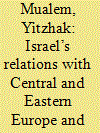

|
|
|
|
|
| Summary/Abstract |
This article examines the role of Jewish Diaspora considerations in Prime Minister Benjamin Netanyahu’s policy towards the states of Central and Eastern Europe. Israel has traditionally sought to attain both its state-centred national goals and those of the Jewish Diaspora. Under the Netanyahu governments (2009–21) a major change took place whereby the Diaspora’s existence was viewed as dependent on Israel’s continued survival and success; hence only a strong Israel can help the Diaspora. The security and wellbeing of the Jewish Diaspora thus remains a central Israeli goal, but it is to be pursued via Israel’s strengthening on the one hand, and the deepening of Jewish identity and awareness among Diaspora Jews, on the other.
|
|
|
|
|
|
|
|
|
|
|
|
|
|
|
|
|
|
|
|
|